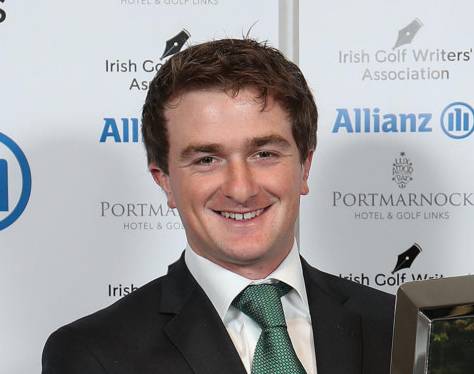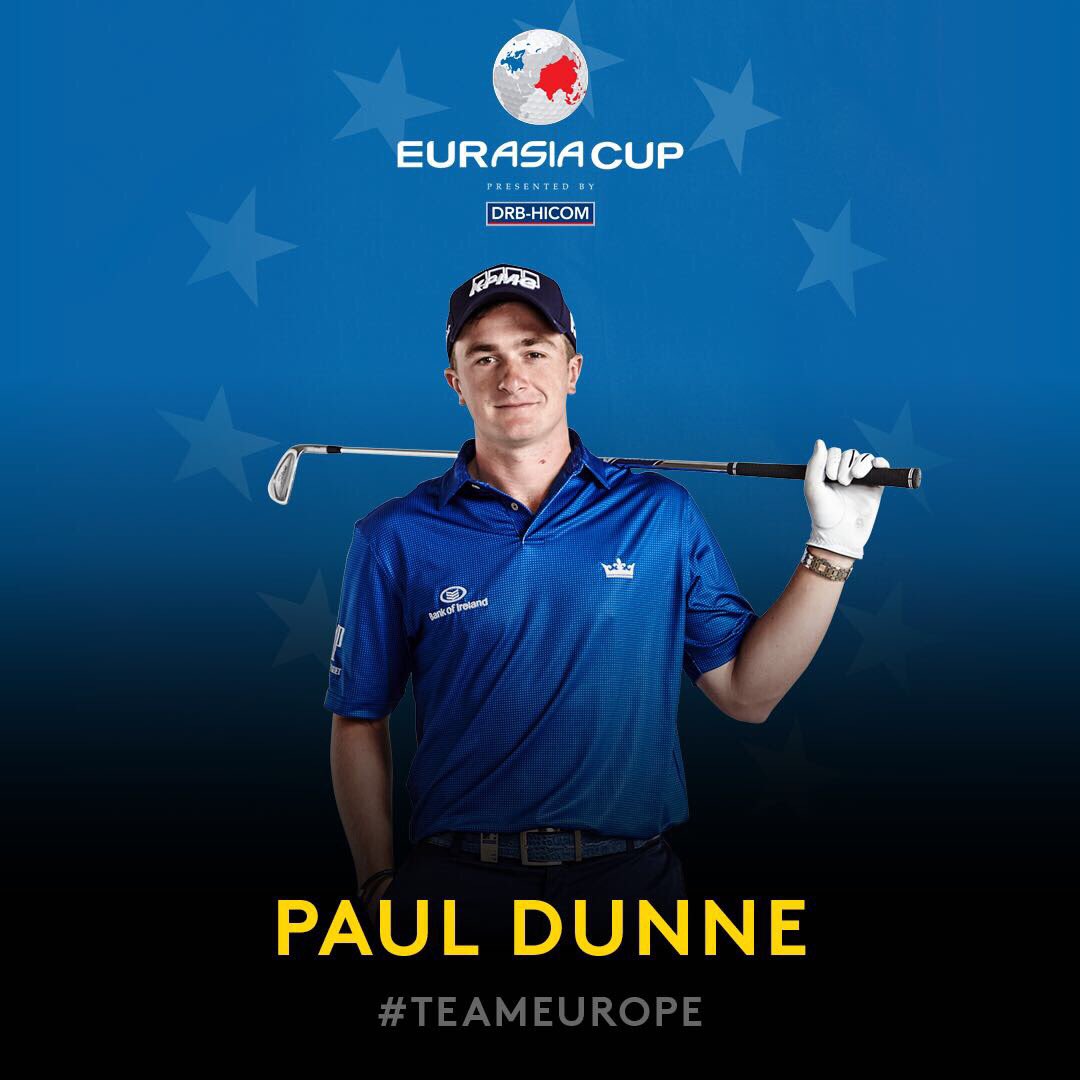Ambitious Dunne hones his killer instinct

Paul Dunne has vowed to keep his foot on the gas and continue his ruthless pursuit of a Ryder Cup debut next year.
The Greystones star (25) shook off what he perceived was becoming a "nearly man" tag by closing with a stunning, nine-under-par 61 to win the British Masters by three shots from Rory McIlroy.
But even after spending 230 days on the road in 2017, turning down a recent offer to play a friendly game with some members and his coach at Augusta National so he could recharge his batteries, he has no intention of resting on his laurels in 2018
Speaking at the Allianz sponsored Irish Golf Writers' Awards, where he followed in the footsteps of Pádraig Harrington, McIlroy, Shane Lowry, Paul McGinley and Darren Clarke in being named "Professional Player of the Year", the world No 76 told RTE's Greg Allen in an interview for the assembled guests at Portmarnock Hotel and Golf Links, "What's done is done. I want to just keep moving forward and keep getting better each year.
"I think I reflect on things I can do better and things I do well so I can keep doing them.
“I have never been one to get too carried away.”
He’s a natural born killer in the Harrington mould and with more wins and a place in Thomas Bjorn’s European Ryder Cup team at the top of his wish list for 2018, he’s no longer the young amateur who led the 2015 Open at St Andrews but a gutsy competitor who knows how to finish.
"When I first stepped out on tour, people kind of looked at me as the guy who led The Open and then fell away," Dunne said of his meteoric rise.
"In my head, I felt like I had that tag on me for a long time, so it was nice to have the tag as a tour winner now.
"I'm not somebody who led a tournament and couldn't win it. I have now been able to close the door, so I have proved that I can do that."
Even after banking €1.69 million to finish 16th in the Race to Dubai in just his second full season on tour, he’s not sitting back but working hard to maintain his strengths and strengthen his weaknesses.
Bjorn will also captain Europe in the EurAsia Cup in Malaysia from January 12-14 and Dunne will just have time to taste his turkey and ham and open his presents before jetting out to Dubai on January 1 to prepare for his professional team debut.
A quick learner with a Harrington-esque mental game —“There is no better role model than Pádraig Harrington for any Irish sportsperson”— his British Masters win opened the doors to some of the game’s biggest events in 2018 such as The Open and at least two WGCs.
But it was also a win that gave him some closure, not only on his playoff loss to Ryder Cup player Edoardo Molinari in April’s Trophée Hassan II but for the 2015 Open at St Andrews, where he held the co-lead as an amateur after 54 holes but shot 78 to trail home tied 30th.
Seeing Molinari finish birdie-eagle to force sudden-death in Morocco before beating him in a playoff was a stark reminder that only the strongest survive on tour.
Fascinating insights from @PaulMcBride0 @leona_maguire and @dunners11 at the @Allianz sponsored @IGWAssociation Awards at @PortmarnockLink Good to hear @Lisa_Maguire_ is also turning pro next year. pic.twitter.com/p8okbR1wRJ
— Brian Keogh (@IrishGolfDesk) December 21, 2017
“I didn’t feel like I did anything wrong but what I took away was that if you want to win, playing okay won't do it,” he said. “If you want to close the door, you kind of have to play great.
“After Morocco, I started to realise the people who were winning, in general, were playing great. They weren't just stumbling over the finish line. They were really bursting through it.”
Dunne was a shot behind leader Robert Karlsson after his third round 65 at Close House but rather than slapping himself on the back for a great round, as he might have done six months earlier, he refocussed.
"I remember finishing and thinking I could have shot 61 on Saturday but I didn't putt overly well, and my focus went away from the fact that I shot 65 and moved to the fact that I was only one behind and if I was to have a chance to win, I needed to putt better," he said.
"So I ended up spending about two hours on the putting green behind the clubhouse. I was nice and secluded there by myself. I played some music just trying to focus my head for the next day. That was the big difference.
"Before I'd have been happy with a 65 and gone out trying to do the same the next time. This time I was more focused on trying to do something better if I really wanted to close the door on people the next year.
Rather than being intimidated by McIlroy’s final round charge, Dunne played his first six holes in five-under-par, then came home in 31, making a clutch birdie at the 17th before chipping in on the last to seal a three-shot win.
“I didn't give anyone the opportunity to have a great finish and catch me,” he said.
“I knew in my head that [Rory] wasn’t going to back off given how successful he has been.
"If it were someone else's name, part of me would have thought they weren't going to make the charge that Rory did. So that helped focus me.
"Rory made a great run but that the end of the day, the only time he got within one was when I was on the 17th tee. He birdied 17 and parred the last. At that point 17 was a great chance, and I knew that if I could birdie 17, I could close it out completely. It was nice to do that, and it was relatively stress-free."
On his decision to go with the driver — a club he admits gives him occasional problems — he had no doubts.
"If I parred 17, I would still have to play a good 18th, and it was a long par three playing over 220," he said. "I just felt I had a chance on 17 to win the tournament with one shot. I could hit one great drive, and the tournament was over.
"Anywhere at the green or left of the green and I felt I was going to make three or have a great chance at it. And I was driving the ball well. You don't lead a tournament driving the ball badly. I know I struggle with it sometimes, but it was good that week. The fairways were generous.
"It was just one of those things. I had the chance. And it was actually a difficult wedge shot - downwind to a tabletop green with the ball below your feet on a downslope. So it wasn't a straightforward wedge shot. The drive was quite easy, and the wedge shot was difficult. So I hit a great drive, a nice pitch and a nice putt. I saw the opportunity, and if I took it, the tournament was over. And if I didn't, I still had a chance to win on the last.
The McIlroy factor stands out for many, but Dunne isn't looking at who he beat but relishing the fact that he finished at the top of the pile.
Making the Ryder Cup team means he must make winning a habit, but with a Masters debut within his grasp if he can make the world’s top 50 before the end of March, he’s setting his sights sky high.
“I think a lot of people are making a big deal about the EurAsia Cup being a trial for the Ryder Cup but it’s not really,” he said. “They don't pick the Ryder Cup team. You have to qualify for it.
“There is a lot of golf to be played between now and then and hopefully, I can give myself a chance between to win some tournaments and have a chance to make the team come September.”
Clearly a cerebral golfer — his deliberate approach means he's under pressure from referees — comparison with Harrington are inevitable.
"The referees get on my back a little bit for that one," he said of his slowcoach tag.
"I like to think about what I do a lot. I like to analyse it. That's just the kind of person I am. I don't know if that makes me better than anybody else or not. That's just the kind of person I am.
"Other people are more instinctive, but I like to think things out a bit more. That's just the way I am. If I play differently, I feel uncomfortable, and I tend not to play as well. I tend to take a bit of extra time to make my mind up and weigh up different options and pick the right shot."
Harrington is a player he now knows well, but he jokes that he is not quite in that league just yet when it comes to the Dubliner's more unconventional methods and has not spoken to him about slow play.
"I haven't spoken to Pádraig about it, but I have been lucky enough to spend a lot of time with Pádraig in the last year and a half as a pro," he said.
"When I was growing up, he was my idol when everyone idolised Tiger Woods. As Irish golf goes, there is no better role model than Pádraig Harrington. I think for any Irish sportsperson, there is no greater role model than him either. He works so hard.
"Maybe he wasn't given as much talent as everyone else in the top 10 in the world, but he worked his way there. That's how I saw my game as well. I feel like I can relate a lot to him. I have had a lot of dinners with him since, and he tells me a lot of things that I definitely can't relate to."
Asked if Harrington has a level of processing that he simply can't relate to, he laughed and joked: "I hope so!"
All going well, he will spend another seven months on the road in 2018, but he couldn't be happier.
"It's 230 days abroad but it's better than 330 days behind a desk!"








